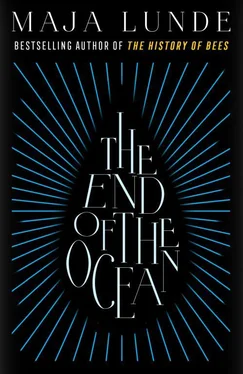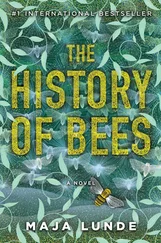The plastic feels hard beneath my fingers when I remove the lid of yet another container, then I lift it, carry it towards the hatch, flip it over and dump the huge white blocks out into the water where they hit the surface with a gentle splash. The ice bobs on the surface—white, shiny cubes against the pitch-black water, amidst the uneven yellow reflections of light from the lampposts on the wharf. Sweat trickles down my back, but my hands are cold inside my gloves, so frozen that I have lost all feeling in them, and the sensation is painful, but satisfying. The ice blocks lie in the water like small icebergs, just the upper portion of them is visible, that’s how it is with floating glaciers, more below the water than above, but these won’t harm anyone, won’t destroy, I am the destroyer here, because the water is warm and the ice will quickly melt. When the skipper comes to start the engine in a few hours, the blocks will already be smaller and, moreover, the salt water will have ruined them. This ice can never be used as ice cubes, it can never, ever be served on a sheik’s table, in a crystal tumbler, in a drink, in Saudi Arabia or Qatar.
Ice that melts, ice that melts in salt water, I am a part of it now, a part of what is taking place at all times. I am compounding the changes. I laugh, startled by the sound of my own laughter, an unfamiliar croaking like a frog. They are dying, the frogs, being wiped out in silence, without the world caring, one third of the world’s species are in danger of extinction, but nobody thinks about it, the frog, as it moves through the world’s marsh landscapes, always in contact with water, slimy, modest, not disgusting enough to be hideous, not strange enough to be amusing, just odd, how it croaks, how it hops, how it flees from humans.
*
Finally I am almost finished. My back is aching, twenty kilos of ice in every container, so heavy, too heavy. I count rapidly, only twelve more, only 240 kilos. I am about to open yet another container but my hands are trembling, my fingers are stiff and then they stop. I’m tired, am just so tired, too old for this kind of lifting, my flesh and bones protest, far too old.
I sit down on the containers. Oh, Magnus, I am incapable of hurling the last of the blocks of ice overboard, our ice, it has been left in peace until now, until you came. But it hasn’t been silent, because ice is never silent, it has its own sound, it creaks. Ice creaking is one of the world’s oldest sounds and it frightens me, has always frightened me. It’s the sound of something going to pieces. And the sound of a stone that fails to penetrate the ice, but gives off an echo all the same, is a sound like no other, the brief reverberation of the water below, a reminder of everything imprisoned underneath, of how solidly in place everything is.
But it has been a long time since I threw a stone at an ice-covered surface. The ice no longer forms on the lakes. In the wintertime, pollen season is already underway in January. The ice is washed away by the rain and the world is being covered by flowing water. I used to go skating, I remember, on the fjord, I skated faster than everybody. Magnus stood onshore and watched me, we were ten or eleven, we still didn’t know one another but I remember that I liked that he watched me, that he knew I was the fastest. I had skates that I screwed onto my boots, with sharp blades. Nobody uses those any longer, they buy new skates every single autumn, new skates every year for the children. Black hockey skates or white for figure skating, they think that one has to have skates, but nobody uses them, because the lakes don’t freeze over any longer and everything I have done has been to no avail. I have really tried, I have been fighting for my entire life, but I have been mostly alone; there are so few of us, it was futile, everything we talked about, everything we said would happen has happened, the heat has already arrived, nobody listened.
Magnus, your grandchildren will not be able to skate across the lakes. Nonetheless, you have approved this—our glacier, the ice—you have disassociated yourself to such a large extent from everything that once was ours, or perhaps you have always been like this, you have just let it happen. I can hear you, how you are thinking now, how people like you think, we’re just following the development, what I have allowed to happen is happening everywhere, evil’s banality, you have become like Eichmann. But nobody holds you accountable. Your Jerusalem never arrives.
I have these twelve containers, twelve containers containing ice one thousand years old. I am not going to throw them overboard, because you have to see them, Magnus, you can’t just sit down there and let it happen; it’s not supposed to be as easy as that, you are going to see the ice, feel it, you will personally stand next to it while it melts, you will have the chance to walk on it, step on it, it will melt beneath your feet, the way it once melted under our feet.
Again I start lugging containers. One by one I take the twelve containers of ice with me out of the cargo ship, over onto Blue .
Once again my hands were immersed in soapy water. It foamed between my fingers and soaked through our clothing.
My shirt swelled like a taut balloon on the surface until the water prevailed.
As the filth released its grip on our clothes, the color of the soap and water changed from transparent to a nondescript grayish brown.
The air in the sanitary barracks was stagnant, with a strong odor of cleaning products. Familiar. Anna’s head bent over the washing machine at home. August’s teeny-tiny garments, clean and damp. The smell that spread through the room, covering up the aroma of food and the faint stench emanating from the trash can in the heat.
Anna and the laundry. The teeny-tiny garments.
I swallowed and tried to concentrate on what I was doing.
A few spots refused to come out, and remained in the fabric like shadows. Dried blood from a scrape on the knee that had long since turned a rusty brown color. Purple spots from unripe cherries picked one night in someone’s garden. They appeased our hunger pangs for a little while, but the craving in our stomachs was replaced by a sour sensation.
It was our fourth day in the camp. Already every day was the same. Jeanette’s office in the morning. Nothing new. Every day I asked if there was anything more I could do, anything else. But she shook her head. Then eat. Sweat. Listen to Lou talk, unable to pay attention. Pull myself together. Ask somebody about the time. Nothing new, no. Try to listen to Lou. Try to play. Try not to think. About Anna, about August, about the fire. Eat again. Wait for the evening, for the heat to abate. Sleep. Wait for the next morning and another visit to the Red Cross.
But today we were allowed to wash our clothes. Laundry tubs were set up on a simple work bench. Seven liters of water we had been given for this. A little treasure trove of water.
Lou was also washing her clothes. She was wearing only her underpants and scrubbing her shorts in a tub in front of her.
The door behind us opened. I turned around. It was a woman holding dirty laundry in one hand and a small water jug in the other.
I nodded and said hi.
She mumbled a reply, took one of the tubs down from the shelf, poured some laundry detergent out of a can, sprinkled it across the bottom, and filled the tub with water, doing everything quickly and expertly.
She sat down on the other side of Lou. I tried to smile, but she didn’t seem to notice, was busy with her laundry.
She put a dress in the water, a floral print, it looked expensive. After that a blouse made of a thin, silk-like fabric.
“Nice,” I said.
Читать дальше










